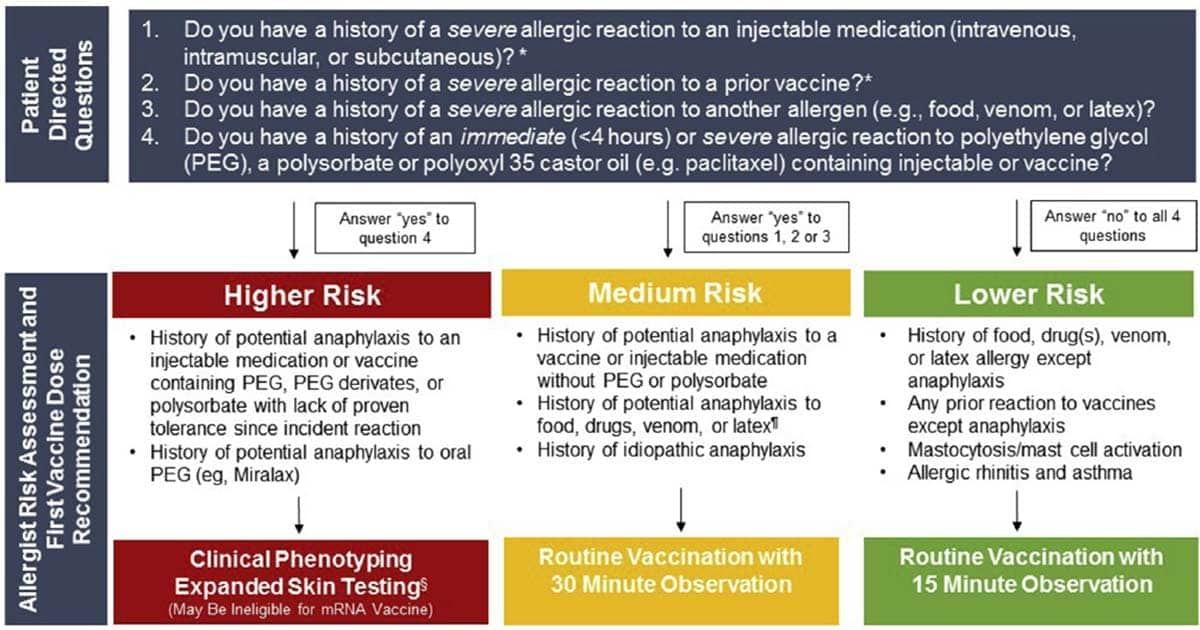Note: This issue is evolving. We will update this post as news comes out. This post was updated on September 30, 2021.
What is the current guidance for administering COVID-19 vaccines in the U.S. for people with allergies?
The U.S. Centers for Disease Control and Prevention (CDC) has issued guidance for people with allergies and whether they should receive the Pfizer/BioNTech, Moderna or Johnson & Johnson vaccines.
Pfizer/BioNTech and Moderna are Messenger RNA (mRNA) vaccines and come in two doses. They are designed to trigger an immune response that produces antibodies and protects people from getting infected when exposed to the real virus.
The Johnson & Johnson vaccine is a viral vector vaccine that is a single dose. It uses a common cold virus as a vector with genetic material from COVID-19. When introduced into cells, it trains the immune system to protect itself from COVID-19.

The guidance for the Pfizer/BioNTech and Moderna vaccines state the following:
People who should receive the Pfizer/BioNTech or Moderna vaccine
- Anyone with a history of food, insect venom, oral medications, environmental or latex allergies
- Anyone with a family history of anaphylaxis not related to mRNA vaccines
Must undergo a 15-minute observation period (30 minutes if there’s a history of anaphylaxis) after receiving the vaccine to ensure there’s no allergic reaction.
People who should first consult with their doctor before getting either of the Pfizer/BioNTech or Moderna vaccines
- Anyone with a history of anaphylaxis or non-severe immediate allergic reactions to other vaccines
Discuss risks of vaccine and whether to wait to receive the vaccine. If it’s decided you can receive the vaccine, you must undergo a 30-minute observation period after receiving it to ensure there’s no allergic reaction.
People who should not receive either of the Pfizer/BioNTech or Moderna vaccines
- Anyone with a history of anaphylaxis to any component of the Pfizer/BioNTech or Moderna vaccines (anyone who experiences anaphylaxis after getting the first dose of the vaccine should not get the second dose)
- Anyone with a history of non-severe immediate allergic reactions to any component of the vaccines (anyone who experiences non-severe immediate allergic reaction to the first dose should not get the second dose)
- Anyone who is allergic to polyethylene glycol (PEG). PEG is a component in both vaccines

Free COVID-19, asthma, COPD screenings and digital health support —>
What process is used to determine if a person is at risk for an allergic reaction from a COVID-19 vaccine?
The CDC updated its guidance on December 30 with this chart on how patients should be triaged when they present for a mRNA COVID-19 vaccination.
† See Appendix C for a list of ingredients. Persons with a contraindication to one of the mRNA COVID-19 vaccines should not receive doses of either of the mRNA vaccines (Pfizer-BioNTech or Moderna).
* Immediate allergic reaction to a vaccine or medication is defined as any hypersensitivity-related signs or symptoms consistent with urticaria, angioedema, respiratory distress (e.g., wheezing, stridor), or anaphylaxis that occur within four hours following administration.
‡Includes persons with a reaction to a vaccine or injectable therapy that contains multiple components, one of which is a vaccine component, but in whom it is unknown which component elicited the immediate allergic reaction.
#Polyethylene glycol (PEG) is an ingredient in both mRNA COVID-19 vaccines, and polysorbate 80 is an ingredient in Janssen COVID-19 vaccine. PEG and polysorbate are structurally related, and cross-reactive hypersensitivity between these compounds may occur. Persons with a contraindication to mRNA COVID-19 vaccines (including due to a known [diagnosed] allergy to PEG) have a precaution to Janssen COVID-19 vaccine. Among persons who received one mRNA COVID-19 dose but for whom the second dose is contraindicated, consideration may be given to vaccination with Janssen COVID-19 vaccine (administered at least 28 days after the mRNA COVID-19 dose).
Persons with a contraindication to Janssen COVID-19 vaccine (including due to a known [diagnosed] allergy to polysorbate) have a precaution to mRNA COVID-19 vaccines. In patients with these precautions, vaccination should be undertaken in an appropriate setting under the supervision of a health care provider experienced in the management of severe allergic reactions. Consider referral to allergist-immunologist.
An article in press, corrected proof December 31, 2020 in the The Journal of Allergy and Clinical Immunology: In Practice includes this flow chart. It’s useful for healthcare professionals and patients.
Both the Pfizer/BioNTech and Moderna vaccines are administered in two doses. If you experience an allergic reaction to the first dose of the vaccine you may be ineligible for the second dose. The following flow chart from JACI: In Practice shows how healthcare professionals determine if a person should receive a second dose.
What are the ingredients to the COVID-19 vaccines?
The Journal of Allergy and Clinical Immunology in Practice, Corrected proof. doi:10.1016/j.jaip.2020.12.047 Used with permission.
What is known about cases of allergic reactions to COVID-19 mRNA vaccines in the United States?
CDC conducted research on vaccine administration through the first two months the mRNA vaccines were made available to the general public.
- Through Jan. 24, 2021, there were 50 reported cases of anaphylaxis in the United States after 9,943,247 doses of the Pfizer/BioNTech vaccine, according to the latest data from CDC’s Advisory Committee on Immunization Practices (ACIP). This amounts to 5.0 cases of anaphylaxis per 1 million doses given.
- For the Moderna vaccine, through Jan. 24 there were 21 reported cases of anaphylaxis in the United States after 7,581,429 doses. This amounts to 2.8 cases of anaphylaxis per 1 million doses given.
In most of the cases, anaphylaxis occurred in people who had a prior history of allergies or allergic reactions. Most of the reactions occurred within 15 minutes after the vaccine was given. No cases resulted in death.
In a study published in JAMA Network Open in September 2021, allergic reactions to the mRNA vaccines were determined to be rare, typically mild and treatable. The study analyzed 22 potential allergic reactions to the first 39,000 doses of Pfizer/BioNTech and Moderna COVID-19 vaccines given to healthcare providers at Stanford University.
Among the 39,000 doses, 22 people experienced symptoms that would be classified as a possible allergic reaction. Most symptoms were mild. Three people were given epinephrine to treat possible anaphylaxis. All 22 recovered from their reaction.
Most people in the study who developed reactions were found to be allergic to ingredients that stabilize the vaccine, not components of the vaccine that provide immunity to COVID-19.
Reports of allergic reactions and anaphylaxis should not deter anyone from seeking out the COVID-19 vaccine. “The vaccines are very safe, and severe allergic reactions are rare,” CDC says. Always keep with you two epinephrine auto-injectors if you know you are at risk for anaphylaxis.
CDC, the National Institute of Allergy and Infectious Diseases (NIAID) and the U.S. Food and Drug Administration (FDA) are working with vaccine manufacturers to further research COVID-19 vaccines and severe allergies.
What is known about the Johnson & Johnson vaccine and allergic reactions?
In Johnson & Johnson’s press release announcing FDA approval of its COVID-19 vaccine, it states:
“There is a remote chance the Janssen COVID-19 Vaccine could cause a severe allergic reaction. A severe allergic reaction would usually occur within a few minutes to one hour after getting a dose of the Janssen COVID-19 Vaccine. For this reason, your vaccination provider may ask you to stay at the place where you received your vaccine for monitoring after vaccination.”
Johnson & Johnson says you should not get its COVID-19 vaccine if you have had a severe allergic reaction to any ingredient in its vaccine.
Prior to vaccination, be sure to tell the vaccine provider if you have any allergies. You should also tell the vaccine provider if you’re immunocompromised or you’re on a medicine that affects your immune system.
If I had an allergic reaction to the Pfizer/BioNTech or Moderna vaccines, can I get the Johnson & Johnson vaccine instead?
The vaccines are not designed to be interchangeable. However, people who had an allergic reaction to the first dose of either the Pfizer/BioNTech or Moderna vaccines may be approved to get the Johnson & Johnson vaccine – but they must wait at least 28 days between injections.
It’s important to check the ingredients of the Johnson & Johnson vaccine to confirm you are not allergic to any of its components as well.
How common is anaphylaxis to a vaccine?
Anaphylaxis to vaccines are extremely rare. They can occur due to the presence of a particular ingredient or preservative, such as egg or gelatin, however, for most people the amount is so tiny that it is unlikely to trigger a severe allergic reaction.
Do the COVID-19 vaccines contain egg?
No. Further, there is no link to the vaccines and concerns of egg allergy and flu vaccine, as has been falsely reported by some media outlets.
Do the COVID-19 vaccines contain any preservatives?
The COVID-19 vaccines do not contain any preservatives that may trigger an allergic reaction.
Do the COVID-19 vaccine stoppers contain any natural rubber latex?
The vial stoppers in all three of the available vaccines are not made with natural rubber latex. The vaccines are safe for people with latex allergy.
What are normal side effects to the COVID-19 vaccines?
People who receive either of the Pfizer/BioNTech and Moderna vaccines may experience the following:
- Swelling or pain at the point of injection
- Fatigue
- Headache
- Fever
- Muscular or joint pain
- Dizziness
These side effects are considered normal as your body builds protection to the coronavirus.
Do the COVID-19 vaccines contain PEG?
Both the Pfizer/BioNTech and Moderna vaccines contain polyethylene glycol (PEG), a compound that helps the vaccine access cells. Allergic reactions to PEG are considered rare. People with a history of severe allergic reactions to PEG should not receive either of these vaccines.
The Johnson & Johnson vaccine contains polysorbate 80, which is closely related to PEG. Allergic reactions to polysorbate 80 are also rare. Talk with your doctor about the COVID-19 vaccine if you have a known allergy to polysorbate.
According to CDC, people who cannot take the Pfizer/BioNTech or Moderna vaccines due to a PEG allergy have a precaution when taking the Johnson & Johnson vaccine. People who cannot take the Johnson & Johnson vaccine due to a polysorbate allergy have a precaution when taking the Pfizer/BioNTech or Moderna vaccines.
People with these precautions should get vaccinated in a medical facility with access to emergency anaphylaxis treatment.
What is the treatment for a severe allergic reaction (anaphylaxis) to the COVID-19 vaccine?
Anaphylaxis is a life-threatening reaction that affects more than one body system. No matter the cause of the anaphylaxis, the treatment is the same: epinephrine first and epinephrine fast. Epinephrine is the only drug that will reverse anaphylaxis. People at risk for anaphylaxis should always carry epinephrine. Don’t rely on antihistamines – they only treat minor symptoms like hives and can take 30 minutes to work.
Are other COVID-19 vaccines available?
COVID-19 vaccines from other pharmaceutical companies are expected to arrive soon. Similar allergy concerns may arise with these new vaccines. We urge people with a history of severe allergic reactions to consult with a board-certified allergist if they are concerned about the COVID-19 vaccine.
What about COVID-19 vaccine and asthma?
People with underlying medical conditions such as asthma can receive the COVID-19 vaccine as long as they have not had an immediate or severe allergic reaction to the vaccine or any of its ingredients.
See Our latest Covid-19 Articles:
The COVID-19 pill is considered a major step forward in managing COVID-19. Two COVID-19 antiviral pills are currently available. Updated: January 5, 2024
What you need to know about COVID-19 risk, asthma and allergies if you host or visit relatives during the holidays.
How to Stay Safe on Halloween with Asthma and Allergies
Learn how you can minimize risk and maximize safety at Halloween when you have a child with a food allergy, asthma or latex allergy.
Why Getting the Flu Shot Is Critical for People with Asthma
If you have moderate to severe asthma, learn why getting your flu shot is especially important due to the ongoing COVID-19 pandemic.
Albuterol in Short Supply? Here’s What to Do

Quick 3-5 minute videos on asthma, allergies, and related conditions.






 810304 Eaton Place, Suite 100
810304 Eaton Place, Suite 100